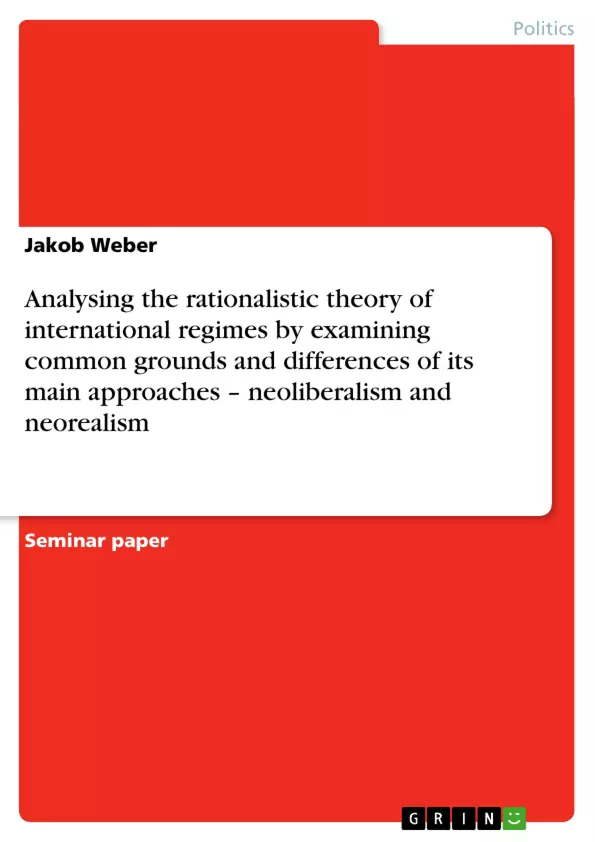When one wants to understand international regimes – their formation, maintenance and breakdown, the best way to begin is to try analysing these aspects by looking at and using theories connected to these specific problems. In our case we have a set of three main theories that are concerned with the wide field of international regimes: interest-based neoliberalism, power-based neorealism and knowledge-based cognitivism. Each of those theories has a unique view of international regimes and the phenomena related to them, although when looked at closer, one notices that they do in fact have several things in common. Of these three, neoliberalism and neorealism are both rooted in and based on the theory of rational choice – that is rationalism. Within the boundaries of rationalism however they do preserve their own interpretations of international regimes. In this essay we will therefore focus on the converging aspects of neoliberalism and neorealism as well as on their differences. Thus in the end it is our goal to show possible ways of how these two rationalistic approaches could be amalgamated so that their advantages may be used in a combined form by future political scientists, not ignoring the difficulties that one faces, when making such an attempt.
Inhaltsverzeichnis (Table of Contents)
- Introduction
- The concepts of neoliberalism and neorealism
- The influence of hegemony on international institutions
- Prospects for synthesis
- Conclusion
Zielsetzung und Themenschwerpunkte (Objectives and Key Themes)
This essay examines the convergence and divergence of two prominent theories in international relations: neoliberalism and neorealism. The main goal is to analyze how these rationalistic approaches can be combined to enhance future research in political science, considering the inherent challenges involved in such an amalgamation.- The role of states as rational actors in international politics
- The importance of gains in regime formation
- The impact of anarchy on interstate cooperation
- The role of international institutions in mitigating anarchy
- The Prisoner's Dilemma and its implications for regime formation
Zusammenfassung der Kapitel (Chapter Summaries)
- Introduction: This chapter introduces the three main theories concerning international regimes – neoliberalism, neorealism, and cognitivism – highlighting their unique perspectives and shared foundations in rationalism. It outlines the essay's focus on the converging and diverging aspects of neoliberalism and neorealism, aiming to explore the potential for synthesizing their strengths.
- The concepts of neoliberalism and neorealism: This chapter delves into the distinct approaches of neoliberalism and neorealism towards regime formation. It discusses the role of states as rational actors seeking absolute (neoliberalism) and relative (neorealism) gains, respectively. The chapter emphasizes the importance of cooperation and the challenges posed by anarchy, which can lead to concerns about cheating and relative gains.
Schlüsselwörter (Keywords)
This essay focuses on the key concepts of neoliberalism, neorealism, rational choice, international regimes, regime formation, interstate cooperation, anarchy, absolute gains, relative gains, and the Prisoner's Dilemma. It explores the theoretical frameworks of these concepts, analyzing their implications for understanding the dynamics of international politics.Frequently Asked Questions
What is the difference between neoliberalism and neorealism in international relations?
Neoliberalism focuses on absolute gains and the potential for cooperation through institutions, while neorealism emphasizes relative gains and the struggle for power under anarchy.
How do international regimes form according to rationalistic theory?
Regimes form when rational states realize that cooperation can provide benefits (gains) that outweigh the risks of acting alone, despite the challenges of anarchy.
What is the "Prisoner's Dilemma" in the context of international regimes?
It is a model used to explain why states might not cooperate even when it is in their best interest, due to fears of cheating and the lack of a central enforcing authority.
What are absolute gains versus relative gains?
Absolute gains refer to the total benefits a state receives regardless of others, whereas relative gains focus on how much more a state gains compared to its rivals.
Can neoliberalism and neorealism be synthesized?
The essay explores the potential for an amalgamation of these theories, suggesting that combining their insights on power and interest can lead to a more comprehensive understanding of international politics.
- Quote paper
- Jakob Weber (Author), 2009, Analysing the rationalistic theory of international regimes by examining common grounds and differences of its main approaches – neoliberalism and neorealism, Munich, GRIN Verlag, https://www.grin.com/document/134262



